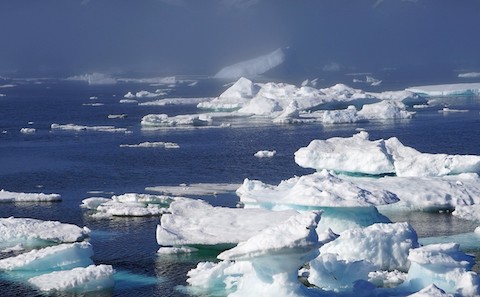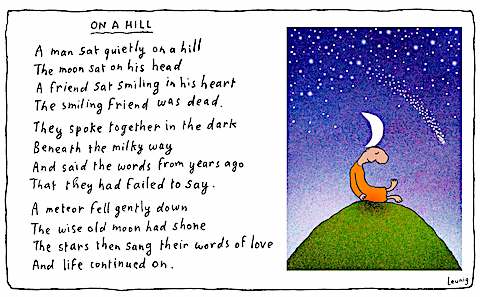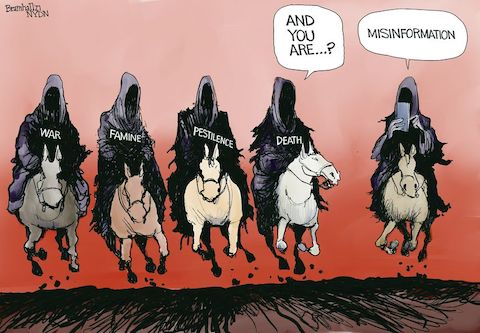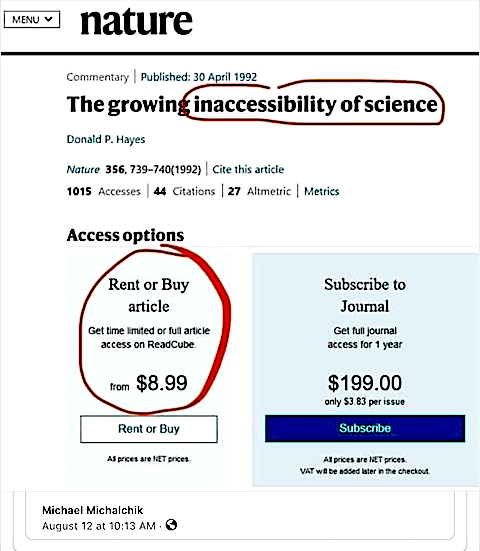Indi Samarajiva is a cultural critic/analyst living in Colombo, Sri Lanka. He’s been writing about culture and collapse as long as I have. Last year, in a remarkable series on collapse described in more detail in the section below, he wrote: “All the Earth is a palimpsest.” A palimpsest is “something reused or altered but still bearing visible traces of its earlier form”, named after scrolls that reused parchment for new texts. The term is also used to described repurposed materials, resources and processes in architecture and archeology, and derives from the Greek words meaning “re-scraping”.
It’s an amazing word, and the most eye-opening idea about human culture’s evolution I’ve encountered in a long time. We are, by nature, and have always been, a scavenger species.
COLLAPSE WATCH

The accelerated melting of the Greenland Ice Sheet threatens to collapse the Gulf Stream, which is already severely weakened. Image by pxhere, CC0
Collapse is here: A three-part series by Indi Samarajiva. Part 1, Part 2, and Part 3. “If you’re waiting for a moment where you’re like ‘this is it,’ I’m telling you, it never comes. Nobody comes on TV and says ‘things are officially bad.’ There’s no launch party for decay. It’s just a pileup of outrages and atrocities in between friendships and weddings and perhaps an unusual amount of alcohol. Perhaps you’re waiting for some moment when the adrenaline kicks in and you’re fighting the virus or fascism all the time, but it’s not like that… Collapse is just a series of ordinary days in between extraordinary bullshit, most of it happening to someone else. That’s all it is.” Thanks to PS Pirro for the links.
The Gulf Stream is collapsing: Rapid warming in the Arctic has weakened and threatens to collapse the global Gulf Stream. “A shutdown would have devastating global impacts and must not be allowed to happen, researchers say”.
The Club of Rome 1972 Limits to Growth ‘end game’ is unfolding exactly as they predicted: “the current business-as-usual trajectory of global civilization is heading toward the terminal decline of economic growth within the coming decade—and could trigger societal collapse by around 2040“. Thanks to all those who pointed me to this item.
Overshoot: A billion displaced by 2050, and it’s all downhill from there: Bill Rees explains the concept and problems of overshoot, our mythology of perpetual technology-driven growth, our denial of the realities of what we face, and its consequences — civilizational collapse with population plummeting to 1-2 billion in the coming decades.
America’s likely violent future: Richard Heinberg is not optimistic about how fundamentalist, denialist, gun-crazed America is going to manage collapse.
Is Chico a warning for what we will soon all face?: Chico California has gone in a few short years from a humanitarian haven for victims of wildfires to a divided, angry, heartless, everyone-to-their-own dystopia. Thanks to Kavana for the link.
… and I presume everyone heard about the latest, direst, IPCC report, except of course readers of the Murdoch and Postmedia papers.
LIVING BETTER

cartoon and poem by Michael Leunig
“This is what happens when public health fails”: Over 100,000 Americans per year die from fentanyl poisoning from tainted street drugs. All it would take would be for the politicians, and the communities, to listen to what the public health experts are desperately saying, and implement policies that have been instituted in some other countries, to end this scourge. But there’s no sign that’s going to happen in the US, Canada, or other politically divided countries distrustful of what public health speakers urge.
Policing without cops: A model from Oregon that dispatches social workers instead of police in non-violent situations is now being applied, with remarkable results, in communities across North America. Thanks to Kavana for the link.
Naming the hungry ghosts: A comprehensive approach to decolonization can help us deal with the unintegrated traumas of centuries of colonization that haunt us, possess us and poison us. A podcast with 11 interviewees suggests a way forward.
POLITICS AND ECONOMICS AS USUAL

cartoon by Bill Bramhall in the NY Daily News; thanks to David Hodgson for the link
Corpocracy, Imperialism & Propaganda: Short takes:
- Whistleblower Daniel Hale, who leaked information about the US’ savage international assassination-by-drone program, has been imprisoned for 45 months for his honesty. Thanks to Kavana for the link. Since the leaks caused no threat to anyone, the main purpose of the prosecution was to discourage other whistleblowers.
- Jill Lepore explains how Facebook lost its moral compass and became the world’s largest perpetrator of misinformation.
- Indi Samarajiva explains why imprisonment is morally wrong and completely counterproductive.
- Bayer Monsanto will stop selling RoundUp in the US because of legal costs, but will continue selling it everywhere else.
- For decades, the EPA has been working hand-in-glove with the chemical industry to overrule scientists to approve dangerous, profitable new products. Thanks to Kavana for the link.
- Another hearing will proceed on possible RCMP misconduct during its investigation of charges against celebrity millionaire sports administrator and former First Nations Residential School teacher John Furlong. Furlong has successfully dodged charges for his alleged abuse of children at those schools for decades.
- Zeynep Tüfekçi explains why ransomware attacks are only going to get worse, and the danger they pose to online commerce.
- Jonathan Pie skewers the Republicans who deny the violence that occurred, and the threat that the January attack on the US Capitol posed.
CoVid-19 Becomes the Pandemic (mostly) of the Unvaccinated: Short takes:
- A year ago, I accurately predicted where we’d be right now; we failed the “endurance test”, and even Australia now looks like it may fail that test too. The Atlantic concurs.
- Canada faces the fourth wave, with a surge of cases but manageable hospitalizations and few deaths; the UK is faring far worse and the US, well, you know
- The case for masks indoor even when vaccinated
- A lot of the unvaccinated are NOT anti-vaxxers or denialists
What happened in Afghanistan: An excellent summary by Anatol Lieven of the utterly misunderstood (by the invading forces) Afghani culture, and why the transition of the entire country to Taliban control proceeded so quickly and (relatively) peacefully once the invasion force announced it was withdrawing. Afghanistan’s culture is one of negotiation and agreements, and they were already in place well before the actual troop pullouts occurred.
FUN AND INSPIRATION

cartoon by the late Charles Barsotti
Why it’s hard to be rational: Joshua Rothman explains how our lack of self-awareness of our knowledge and our biases, our emotional reactions, a culture of distrust, and our fear of being wrong, lead us to muddle-headed thinking, beliefs and actions.
Monthly dose of Schmachtenberger: A recent interview with Daniel covers subjects as broad as collective intelligence, consciousness, the nature of reality, how we assess risk, and the nature and dangers of technology. It’s long, but the outline at the top parses it into bite-sized subjects, so you can listen a bit at a time. And if that’s not enough, read what he describes as the dance of the Tao and the “essence of thingness”.
You are two, or nothing: Two popular and worth-exploring ‘sister’ YouTube channels on science, philosophy, culture and technology are Ireland’s CGP Grey and Germany’s Kurzgesagt. In my favourite videos, CGP explains how the hemispheres of the brain operate, and how they can actually be telling us very different things, each in their own way. And then Kurzgesagt riffs off that to tell us who we really are. Thanks to Peter Frinton for the links.
This month’s best Beaverton headlines:
-
- Tumultuous Canadian Green Party threatens to split into blue and yellow parties
- We used to experiment by launching monkeys into space. Now, we use CEOs. Progress.
Escaping from QAnon: A member of the cult explains how she got sucked in, and how she got out. Thanks to Kavana for the link.
THOUGHTS FOR THE MONTH

’nuff said
By Dorianne Laux, “Twelve Days of Rain”, from What We Carry:
Today, pumping gas into my old car, I stood
hatless in the rain and the whole world
went silent—cars on the wet street
sliding past without sound, the attendant’s
mouth opening and closing on air
as he walked from pump to pump, his footsteps
erased in the rain—nothing
but the tiny numbers in their square windows
rolling by my shoulder, the unstoppable seconds
gliding by as I stood at the Chevron,
balancing evenly on my two feet, a gas nozzle
gripped in my hand, my hair gathering rain.
And I saw it didn’t matter
who had loved me or who I loved. I was alone.
The black oily asphalt, the slick beauty
of the Iranian attendant, the thickening
clouds—nothing was mine. And I understood
finally, after a semester of philosophy,
a thousand books of poetry, after death
and childbirth and the startled cries of men
who called out my name as they entered me,
I finally believed I was alone, felt it
in my actual, visceral heart, heard it echo
like a thin bell. And the sounds
came back, the slish of tires
and footsteps, all the delicate cargo
they carried saying thank you
and yes. So I paid and climbed into my car
as if nothing had happened—
as if everything mattered.
From Anne Helen Petersen, The ‘Capitalism is Broken’ Economy (thanks to PS Pirro for the link)
We should ask ourselves, our communities, and our government: if a business can’t pay a living wage, should it be a business? If it’s too expensive for businesses to provide healthcare for their workers, maybe we need to decouple it from employment? If childcare is a market failure, but we need childcare for the economy to work, how can the government build that infrastructure? If the pay you provide workers doesn’t allow them to live in the community, what needs to change? Collectively, we should be thinking of different funding models, different ownership scenarios, and different growth imperatives. Failure to do so is simply resigning ourselves to another round of this rigged game.
From Caitlin Johnstone:
Millions of highly traumatized men came home from the World Wars and started families and poured all their trauma into the minds of their children. That trauma has been passed down through subsequent generations. That’s the real lasting legacy of those wars, not the stuff in the movies.
From PS Pirro: The body remembers:
I live in a haunted land, where the dead don’t stay buried. Where swamps were drained and forests cleared, scattering the remnant living west into the tall grass, as if woodland and prairie were interchangeable.
As if the living wouldn’t be driven from that new land, too.
What remains here are ghosts of another way to be. Disturbing a peace we’ve never cared to make.
On the four-lane driving home I’m surrounded by pickup trucks, imposing hulks with tinted windows, objects in my mirror that are closer than they appear. The meat inside: guts or brains? asks the famous poem.
Either way, they disturb what peace I have. I’m relieved when they speed around me. Not so relieved that I don’t curse them, of course. Quietly, and without a rude hand gesture. I don’t wish to get shot.
This week is the 100th anniversary of the Tulsa Race Massacre. A pivotal event in U.S. history that most of us — myself included — had not heard of until recently. An entire thriving black community burned to the ground by a white mob. The act erased from the archives. Expunged from official memory.
Still, the body remembers. The splinter works itself to the surface.
The body of the land remembers. The dead walk abroad.
The body as memorial. The land as memorial. Guts and brains. Forest and swamp.





From the ‘rationality’ article: “Even Greg admitted that it was difficult work: he had to constantly inspect his thought processes for faults, like a science-fictional computer that had just become sentient.” Yes, ‘I’ often observe ‘my’ thoughts. Hmmmm, I imagine Nancy would say that errs in believing there is a thinker separate from thought. Anyhow, doesn’t seem like Greg’s rationality kept him from participating in the current gross inequality of wealth and the seeming fantasy of endless economic growth.
Thanks for collecting these together. No more, no less, just thanks.
Thanks for the inclusions, Dave. I should note that I misspelled Anne Helen Petersen’s name in the link in my post (It has an “e” not an “o” in Petersen), which resulted in the error being shared on yours. O, to have a proof-reader.
The story of Chico, California is heart-breaking on so many levels. It seems we’re all just winging it here in the U.S, with no real understanding of how to take care of each other as a society, or even why we need to.
Thanks Peggy. Spelling corrected.